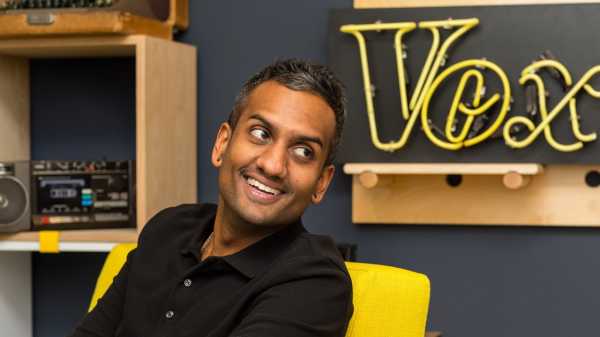
Podcast-wise, 2017 was arguably the year of “The Daily,” the beautifully
produced, gently voiced narrative-news offering from the Times, hosted
by Michael Barbaro, which started last January and quickly became
indispensable. The show, which parses a different news story in each
episode, through a conversation with a reporter or other guest, then
delivers a brief news roundup, has sufficient perspective and empathy
that it produces in its listeners an intoxicating, if temporary, feeling
of sanity; by now, its theme song alone cues in me a Pavlovian calm. The
show garners 4.5 million unique listeners each month; in April, it will
expand to public-radio syndication. In September, at Third Coast, the audio-producers’ conference in Chicago, near-swooning occurred as
Barbaro riffed on “The Daily” over breakfast. Though the show is
expensive to produce, it’s been highly profitable, and its success
seemed to portend that a competitor would eventually emerge. Shortly
after Third Coast, one did: Vox announced a forthcoming daily
narrative-news show, “Today, Explained,” hosted by one of public radio’s
rising stars, Sean Rameswaram, thirty-three, of the excellent “Radiolab”
spinoff “More Perfect.”
At the conference, I’d been impressed by Rameswaram’s sharp, funny
seminar on how to sound natural on tape (answer: by writing for your own
voice, not for the way you think you should sound) and by his d.j.ing
at the conference-closing dance party, which found a balance between
challenging and inclusive. He seemed poised for big things. When I read
the Vox announcement, I thought, Ooh—the plot thickens.
Vox, the news-and-opinion site co-founded in 2014, by Ezra Klein,
Melissa Bell, and Matthew Yglesias, aims to explain the news. It does
this via text, videos, and podcasts, to varying degrees of success.
“Today, Explained,”a co-production of Vox and Stitcher, began in
February and quickly distinguished itself in a few key ways. “The Daily”
comes out in the morning, and has a mood of sober, even sombre,
innocence; “Today, Explained” comes out in the afternoon, when we have
been fully immersed in the world and its mayhem, have no illusions, and
might need a laugh. It might be said to address our
what-the-hell-just-happened feeling. Right out of the gate, the podcast
sounded comfortable and confident; you heard it and thought, Maybe we do need an alternate version of “The Daily.”
In the trailer, Rameswaram explains, “We want to answer all those
questions you’ve been asking yourself, like, Why doesn’t Puerto Rico
have power yet? Or, What would a war with North Korea even look like?
Or, If people keep walking out of the E.P.A., what happens if there’s
another Deepwater Horizon?” He promises us answers to such questions,
and context, and “radio drama, maybe even a song.” Then we hear a song
in which a woman sings, “We’re gonna drop it for the dinner bell every
afternoon”; a faux-scary voice says, “Not on weekends.” It rhymes the
line “The news it comes fast, so we keep it spontaneous” with “Mother[boing] Matt Yglesias.”
Over a pleasing groove, sound bites come in, such as James Comey saying, “Lordy, I hope there are
tapes.”
It feels funny, knowing, and energetic. In this news climate, that isn’t easy.
Twenty episodes in, “Today, Explained” has produced gratifying,
intelligently produced shows on subjects we’d reasonably expect it to
cover—Parkland teens, nuclear anxiety, the steel industry—and on
subjects we might not expect but are grateful for, such as the water
crisis in Cape Town and the West Virginia teachers’ strike. It’s serious
but not self-serious. Episodes are fifteen to twenty minutes long,
shorter if you skip the copious ads for mattresses and toothbrushes. Vox
reporters talk to Rameswaram, who occasionally veers into what I think
of as the Krulwich zone—exaggerated
naïveté for our benefit—but generally he’s a sharp, curious proxy for
the listener.
And he clearly knows his own voice. “This whole process sounds dusty as
fuck,” Rameswaram says in the first episode, “Six Easy Steps to Nuclear
War,” after the Vox reporter Alex Ward describes to him the United States’
nuclear-launch procedure. Basically, Ward explains, the procedure
is, in order: Presidential decision, access the nuclear football, talk
to advisers, access the nuclear “biscuit”—a laminated paper, with codes on it, that the
President carries around—engage nuclear triad,
missiles fly. Ward says that we have “a nuclear monarchy in the U.S.,”
which is “completely dependent upon the President’s feelings” and the
logistics of the location of the football and the biscuit. Carter
accidentally sent the biscuit off with his dry cleaning; Clinton lost it
for a few months and didn’t tell anyone; Reagan’s got mixed up with his
hospital stuff after he got shot and disappeared for a while. “That’s
the system,” Ward says, and we’re given synth music to let us ponder. As
we do, we consider who our President is and what the biscuit might be
going through. By the end of the episode, we’ve been made aware, yet
again, of the awe and terror of national security as it intersects with
the bumbling humanity of our leaders.
At other times, “Today, Explained” gets freewheeling. The show started
its first meme (resulting in a Twitter Moment) in late February. The
team was figuring out how to do its first piece on the Mueller
investigation and wanted to provide a brief primer, Rameswaram
told me recently. But how? The reporter they were talking to, Zack
Beauchamp, said, “If we do the people one by one, it’ll start to sound a
little ‘We Didn’t Start the Fire.’ ” “I said, ‘Oh yeah? That sounds
great!’ ” Rameswaram told me, and he wrote a parody of the Billy Joel
song. (“Meeting at the Trump Hotel / Then director Comey fell / Dutch
attorney van der Zwaan / Holy shit this list is long.”) “We all drafted
it,” Rameswaram said. “My version was the one we eventually went with,
because I seem to have the most experience writing parody music.” (At
WNYC, he’d written a song about the NPR newscaster Lakshmi Singh, which was performed at a live event, after he started a hat-related meme paying homage to her.) The producer-reporter Noam Hassenfeld, who “has a
lot of musical chops,” did the production. In the episode about steel
tariffs, they turned a bit of pre-interview tape in which Yglesias
mumbled a song to himself—“da da da da da da, STEEL”—“into this, like,
hardcore industrial breakdown,” Rameswaram said. “We kind of lean into
who we are and what we find funny and trust our instincts.”
Vox, unlike the Times, has a “startuppy culture,” Rameswaram said. “We
can be a bit salty with our language.” He and the rest of the six-person
podcast team, all from public radio and podcasting, were new to Vox. He
moved to D.C. from New York in November and hired the team; they spent a
few months planning. “It’s a fuck ton of work, I guess is the Vox way of
saying it,” he said. We were talking at 9 A.M. on a Sunday, and he was
preparing to go to the office. The challenge isn’t necessarily being
timely in delivering the news, he said—it’s in the production, making it
distinctive. “We really do aspire to make something that’s fun to listen
to, or at least an emotional experience in some way,” he said. “I mean,
life’s hard enough, Sarah.”
On Tuesday afternoon, having focussed on work for several hours, I knew
about the firing of Secretary of State Rex Tillerson but had not grasped
the full meaning of it. After listening to “Today, Explained,” the
repercussions began to sink in—that his replacement, the
Frank Gaffney-affiliated, anti-Muslim former C.I.A. director Mike
Pompeo, will now have an international diplomatic role, and that Pompeo’s
replacement, Gina Haspel, has overseen torture. At that moment, I
wondered if this podcast, which delivers both sobriety and funny songs,
was where I wanted to be as I realized, yet again, that our country is
in real, unfunny danger (and with a nuclear-launch system that’s run on
emotions and is “dusty as fuck”). But then Rameswaram came back on and
played a song parody, whose lyrics listed the people Trump has fired, to
the tune of “Single Ladies.” I decided that I needed the laugh.
A previous version of this post misstated the year when Vox was founded.
Sourse: newyorker.com






